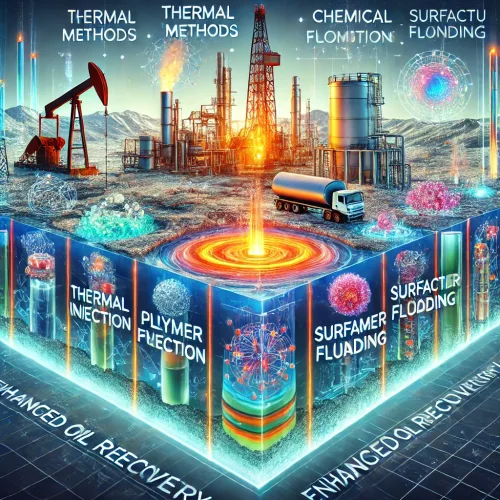
Nanorevolution in Oil Recovery: Transforming Industrial Applications With Nanotechnology
Revolutionizing the Future of Oil Extraction with Innovative EOR Techniques
Skills you will gain:
Nano Revolution in Oil Recovery: Transforming Industrial Applications With Nanotechnology is a comprehensive program designed to explore the groundbreaking role of nanotechnology in enhancing oil recovery processes. This course delves into the principles of nanotechnology, its applications in the oil industry, and the transformative impact it has on efficiency, sustainability, and productivity. Participants will gain insights into the latest advancements and practical applications of nanomaterials in oil recovery, preparing them to lead innovations in the industry.
Aim: The aim of this program is to equip participants with advanced knowledge and practical skills in the application of nanotechnology for oil recovery. The course aims to foster an understanding of how nanomaterials can improve extraction processes, enhance oil recovery rates, and address environmental challenges, ultimately driving the oil industry towards a more efficient and sustainable future.
Program Objectives:
- To provide a thorough understanding of the principles and fundamentals of nanotechnology.
- To explore the various types of nanomaterials used in oil recovery.
- To analyze the mechanisms by which nanotechnology enhances oil recovery processes.
- To discuss the economic and environmental benefits and challenges associated with nanotechnology in oil recovery.
- To examine case studies and practical applications of nanomaterials in the oil industry.
- To highlight future trends, innovations, and research directions in the field of nanotechnology and oil recovery.
What you will learn?
Week 1: Introduction to EOR
- Introduction to EOR
- Definition and overview of Enhanced Oil Recovery.
- Historical context and development of EOR techniques.
- Why Do We Need EOR?
- Importance of EOR in the oil industry.
- Economic benefits and extending the life of oil reservoirs.
- Current trends and future needs.
- Types of Oils in EOR
- Classification of crude oils used in EOR.
- Characteristics and challenges of different types of oils.
- EOR Methods Overview
- Differentiating between primary, secondary, and tertiary recovery methods.
- Overview of various EOR techniques.
Week 2: EOR Methods
- Thermal EOR Methods
- Steam injection: process, benefits, and challenges.
- In-situ combustion: mechanisms and applications.
- Cyclic steam stimulation: advantages and limitations.
- Non-Thermal EOR Methods
- Chemical EOR: polymers, surfactants, and alkaline flooding.
- Gas injection: CO2, nitrogen, and natural gas.
- Microbial EOR: using microorganisms to enhance oil recovery.
- Economic and Environmental Considerations
- Cost analysis of different EOR methods.
- Environmental impact and regulatory considerations.
- Case studies and real-world applications.
Week 3: Intersection of EOR with Nanotechnology
- Mechanisms of Nanotechnology in EOR
- How nanotechnology enhances EOR processes.
- Mechanisms at the nanoscale level.
- Types of Nanomaterials Used in EOR
- Overview of various nanomaterials: nanoparticles, nanofluids, and nanoemulsions.
- Properties and selection criteria for nanomaterials in EOR.
- Applications of Nanotechnology in EOR
- Case studies of nanotechnology applications in EOR.
- Success stories and lessons learned from the field.
- Economic and Environmental Impact of Nanotechnology in EOR
- Cost-benefit analysis of using nanotechnology in EOR.
- Environmental advantages and potential risks.
Week 4: Challenges, Limitations, and Future Prospects
- Challenges and Limitations
- Technical challenges in integrating nanotechnology with EOR.
- Economic and logistical hurdles.
- Environmental and safety concerns.
- Future Prospects and Innovations
- Emerging trends in EOR and nanotechnology.
- Innovative techniques and future research directions.
- Potential breakthroughs and their implications for the oil industry.
- Integration and Case Studies
- Real-world examples of successful EOR projects using nanotechnology.
- Lessons learned and best practices.
- Conclusion and Review
- Recap of key concepts and takeaways from the course.
- Final thoughts on the future of EOR and nanotechnology.
- Q&A session and feedback collection.
Intended For :
- Professionals and engineers working in the oil and gas industry.
- Researchers and academicians in nanotechnology, materials science, and petroleum engineering.
- Graduate and postgraduate students in chemical engineering, petroleum engineering, materials science, and related fields.
- Industry professionals seeking to expand their knowledge in advanced oil recovery techniques and nanotechnology applications.
Career Supporting Skills
